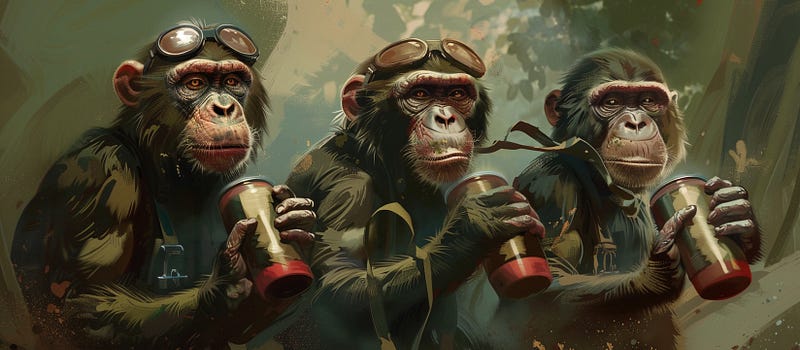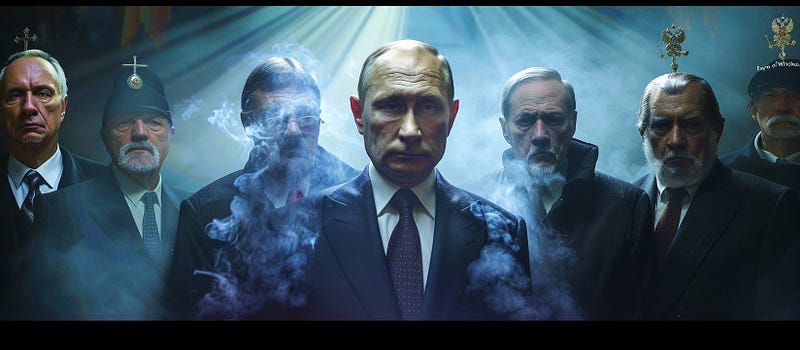Economic Turmoil and Military Struggles: A Ukrainian Perspective
Written on
Economic Instability in Russia
The recent economic developments in Russia have led to a significant shift in currency dynamics. Russian banks are now pivoting away from the US dollar, effectively adopting the yuan as their primary trading currency. This transition appears to be nearing its conclusion, as citizens face increasing difficulties in accessing dollars, resulting in long queues both online and in physical branches.
Currently, the ruble's exchange rate against the dollar has been artificially frozen at 88.xx, rendering it nearly irrelevant in practical terms. With limited options for currency conversion, the black market is rapidly becoming the de facto standard for exchange rates. Many Russians have voiced their frustrations, describing the ruble as "wooden" — a colloquial term implying it holds little value. The demand for Western brands like Apple and Mercedes remains high, yet these goods are largely inaccessible.
The dependency on the yuan has conferred significant control to China over the ruble's value. As Russia sells its oil and gas at prices determined by Beijing, it faces detrimental effects on its economy. Historically, when tied to the dollar, the US had limited influence on the exchange rate due to the relatively minor economic interactions between the two nations. However, this shift towards the yuan is a strategic move by BRICS, primarily driven by China's interests, effectively positioning Russia as a subordinate partner.
In context, it’s common for individuals in both Ukraine and Russia to withdraw foreign currencies from banks, typically opting for US dollars followed by euros. Unlike Americans who often have checking and savings accounts, Ukrainians and Russians maintain accounts in dollars alongside their local currencies. High-value transactions, such as real estate, are frequently conducted in dollars or euros, reflecting a widespread preference for these stable currencies.
The Kremlin's narrative frames this transition as a bold step towards diminishing the dollar's status as the global reserve currency. However, the prospects appear bleak. The ruble lacks the strength to assume such a role, and the yuan is similarly undermined by its instability. Various factors contribute to this uncertainty, including China's closed-off financial data, which deters foreign investment, and its reliance on exports to increasingly unfriendly nations. In a potential trade conflict with the US, America would likely prevail due to its vast consumer base, while China remains vulnerable to disruptions in essential imports.
The Russian stock market has recently experienced a downturn, dropping ten percent from its peak on May 17, falling from 3,500 to 3,171, down from an all-time high of 4,103 in late 2021.
As Armenia contemplates leaving the CSTO, a post-Soviet alliance designed to maintain Russian influence, Kazakhstan is also weighing a similar exit. This trend signals a diminishing grip of Russia on its former territories.
The first video provides an update on the deteriorating situation in Russia amid the ongoing conflict in Ukraine, highlighting the challenges faced by Putin's regime.
Challenges at Zaporizhzhia Nuclear Plant
Reports from former staff at the Zaporizhzhia nuclear power facility suggest a heightened risk of accidents. Staffing has plummeted from 11,000 pre-conflict to a mere 4,000 today, many of whom lack adequate qualifications. Russian military operations, including drone flights and artillery fire near the plant, exacerbate these dangers. One escapee described the current management as akin to "monkeys with a grenade," aptly illustrating the chaotic control exerted by Russian forces.

Misconceptions about Military Production
Contrary to claims suggesting that Russia's artillery shell production outpaces that of the West by a factor of three to four, these assertions are misleading. When comparing only 155mm shells from the West with various calibers from Russia, it becomes clear that Russia's output is actually two to three times lower.
However, sheer quantity does not guarantee effectiveness. Western artillery is more precise, meaning Ukraine may require three shells to hit a target compared to Russia's ten. This advantage arises from superior equipment, better training, and more reliable manufacturing processes.
Opposition to Authority
The "Way Home" movement, consisting of family members of servicemen, has been labeled as "foreign agents" by the Russian government. Similarly, the Omsk Civil Association, which seeks to address local infrastructure issues, has faced similar accusations. Ironically, a deputy from the Yabloko opposition party, designed to provide a façade of dissent, has also been branded a "foreign agent." Even pro-Putin entities like the "Empire of Witches," a group of internet psychics, have faced extremism charges due to opposition from the Russian Orthodox Church.

Putin's Repressive Regime
The consequences of opposing or even superficially supporting Putin's policies can be severe, with many facing arrest. A notable statement from a United Russia official underscores this climate of fear: “We can only prove by deeds and, I apologize for the word, kill those who do not want to see or love us.”
In Summary
Vyacheslav Fetisov, a notable Russian hockey player, recently remarked that athletes representing Russia at the Paris games will need to stay vigilant due to the hostile environment. Meanwhile, Belgorod, often under fire from Ukrainian artillery, has been ironically dubbed the "City Without Danger" for its emergency preparedness.
Kharkiv boasts the largest bomb-shelter school in Ukraine, accommodating 108,000 students, of which 7,500 are set to graduate this year. Amidst this turmoil, Russian citizens have begun to express dissent through graffiti, posting messages like "No to War" and "Putin to the Hague" in public spaces.
Additionally, the Russian "Cinema Fund" has dramatically increased its budget for war-themed films, allocating $24 million in 2022 and $25 million in 2023. These films portray heroic narratives of Soviet forces, highlighting the regime's attempts to glorify military actions.
According to reports, Russia has caused significant destruction in Ukraine, with 210,000 homes damaged or destroyed since February 2022. Major cities including Marinka, Rubezhnoye, and Bakhmut have experienced extensive devastation.
The new Minister of Transport in the Chechen Republic, Adam Cherkhigov, has taken over from his father, continuing a legacy of political dynasties in the region.
That's all for today! Thank you for your attention. I'm heading back to Krakow tomorrow with my new car and hope for a peaceful journey.
Dylan Combellick is a holistic analyst focusing on geopolitics and conflict. A retired intelligence expert and avid traveler, he explores themes related to war and its broader implications.